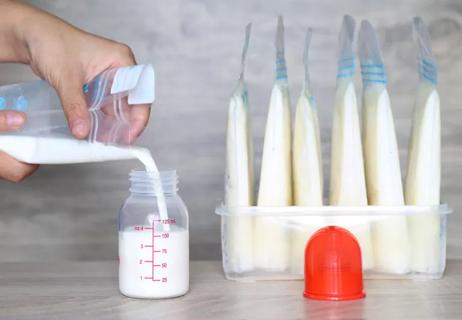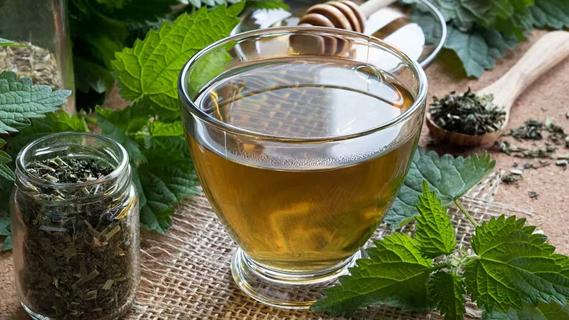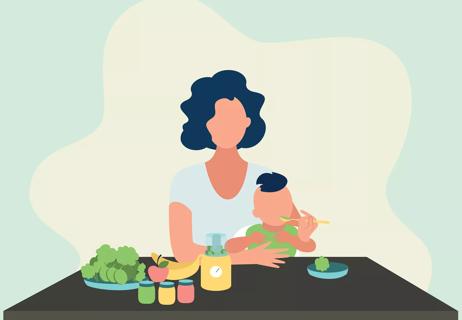It’s highly unlikely your baby will have an allergic reaction to food you eat

There’s a reason breast milk is considered the best source of food for your baby. The American Academy of Pediatrics (AAP) calls breast milk a “superfood” that “provides all the nutrients, calories and fluids needed for your baby’s health.” (Not to mention, it’s free!)
Advertisement
Cleveland Clinic is a non-profit academic medical center. Advertising on our site helps support our mission. We do not endorse non-Cleveland Clinic products or services. Policy
“We know that breastfeeding provides optimal nutrition for babies, and a host of other benefits for parents and babies alike,” says pediatric allergist Jackie Bjelac, MD.
We also know it isn’t always easy, though. Breastfeeding, or chestfeeding, can be time-consuming. It can be physically taxing. And it can make you question what you’re eating and how it affects your baby.
With all the talk about food allergies in kids on the rise, you may wonder how that impacts your breastfeeding diet. For instance, should you avoid familiar allergens, lest they transfer through your breast milk?
We asked Dr. Bjelac about this common concern. Her response? A resounding, “Nope!”
“What’s important when you’re breastfeeding is having a well-rounded diet so you can continue to produce enough milk and breastfeed as long as you wish to,” Dr. Bjelac says. “If you start cutting out a lot of foods, your nutrition can start to suffer, and then supply becomes an issue. It’s hard to successfully breastfeed on a restricted diet, so we never want you to cut foods out unnecessarily.”
Dr. Bjelac explains the connection (or, really, lack of connection) between the foods you eat and food allergies in your breastfed baby.
Advertisement
Babies are absolutely not allergic to breast milk, Dr. Bjelac says. In extremely rare instances, a very small percentage of babies can be allergic to microscopic bits of food proteins that pass through your breast milk. Similarly, a small number of babies can have an intolerance to certain food proteins found in breast milk.
Allergies and intolerances have different symptoms, and there are different recommendations for how to manage your diet.
Dr. Bjelac helps us wade through the recommendations.
When you’re breastfeeding, it’s only natural to worry sometimes about what you eat and how it can affect your baby. (And chances are you’re doing a great job, by the way!)
If you’re concerned the milk in your cereal or the shellfish you ate for dinner is going to bring on an allergic reaction in your baby, Dr. Bjelac says to remember these two things.
Put those together and the answer is clear: It’s incredibly unlikely that anything you eat will cause your baby to have an allergic reaction.
“Babies are not allergic to breast milk,” Dr. Bjelac reiterates. “Very little food protein is passed through breast milk directly to the baby, so the chances that your baby will have an allergic reaction to something you eat is very, very small.”
So, go ahead and eat those peanuts. You could probably use a snack!
OK, but what if your baby is in that 2% to 3% group that does have a food allergy? Well, you likely won’t know until they try the food for themselves, Dr. Bjelac notes.
“The guidelines from the AAP are to introduce some common food allergens, like peanuts, eggs, soy and wheat, when your baby is around 6 months old,” she continues. “It’s when your baby tries foods for themselves that you’ll want to monitor them for signs of an allergic reaction, like swelling or hives.” (Note: The AAP recommends saving cow’s milk, another common allergen, until after your baby’s first birthday. Foods that include milk, though, like whole milk yogurt and cheese, can start being given to babies around 6 months old.)
And if they’re allergic, you’ll know it. “Allergic reactions to foods are not subtle,” Dr. Bjelac says.
Even if your baby is in that very small group of infants who do have an allergic reaction to foods after eating them, that doesn’t mean you have to make any changes to your diet.
Advertisement
Now that probably sounds counterintuitive, so let’s say it again. Your breast milk transfers so little food protein from your diet that you can continue to eat foods that your baby is allergic to while you’re breastfeeding. (That advice changes for babies who have a food intolerance, though. More on that below!)
Research has supported this idea. One study states, “When healthcare practitioners promote the concept that maternal dietary restrictions are an important part of food allergy management, this risks causing harmful adverse effects without benefitting the allergic child.”
That’s right: Restricting your diet can be detrimental to successful breastfeeding, and it will not help your child avoid allergens.
Now, there are times when your healthcare provider may recommend a change in your diet when you’re breastfeeding. Cutting certain foods may benefit a baby who has a food intolerance as opposed to a food allergy, Dr. Bjelac says.
What’s the difference?
| Symptoms | What do to | |
|---|---|---|
| Food allergy | Extreme vomiting; hives or welts; swelling of the face and throat; trouble breathing; wheezing and shortness of breath. | Continue breastfeeding as normal. No need to change your diet. Talk to your healthcare provider, or a pediatric allergist, preferably about allergy testing. |
| Food intolerance | Bloody stool; diarrhea; gassiness; stomach ache. | Talk with your healthcare provider about considering changes to your diet to eliminate the cause of intolerance. Cow’s milk is the most common offender. |
| Symptoms | ||
| Food allergy | ||
| What do to | ||
| Extreme vomiting; hives or welts; swelling of the face and throat; trouble breathing; wheezing and shortness of breath. | ||
| Continue breastfeeding as normal. No need to change your diet. Talk to your healthcare provider, or a pediatric allergist, preferably about allergy testing. | ||
| Food intolerance | ||
| What do to | ||
| Bloody stool; diarrhea; gassiness; stomach ache. | ||
| Talk with your healthcare provider about considering changes to your diet to eliminate the cause of intolerance. Cow’s milk is the most common offender. |
A food intolerance (also called food sensitivity) is a digestive concern, as opposed to an immune system attack. Food intolerance means your baby’s little body has a difficult time breaking down the enzymes in a particular food. Food intolerance will result in gastrointestinal symptoms, like:
Advertisement
Afood allergy, on the other hand, is an immune system response to a particular food (or foods). A food allergy happens when your body mistakes a certain food for a dangerous intruder. Your immune system rallies the troops to destroy it. The result is an allergic reaction. It’s your body overcompensating for what it thinks is a threat. Symptoms of an allergic reaction include:
A food allergy can be dangerous, even life-threatening. A food intolerance, while uncomfortable for baby and distressing for a parent, isn’t an emergency.
If your baby has a food intolerance, they may benefit from you cutting back — or cutting out — the offending food entirely. That’s because food intolerances can be set off by a minuscule amount of exposure to the offending food.
“The amount of protein it takes to trigger digestion problems from a food intolerance is very small — much less than it would take to trigger an allergic reaction,” Dr. Bjelac explains. “So, babies who have an intolerance can benefit from alterations to your diet.”
The most common sources of food intolerance in babies are soy and cow’s milk. Pro tip: If your healthcare provider suggests limiting or eliminating cow’s milk in your diet due to your baby’s intolerance, you’ll want to cut out milk from other mammals, too, including goat’s milk and sheep’s milk. Other milks, like coconut milk and almond milk, don’t need to be avoided in most cases.
Advertisement
If you’re concerned about food allergies or intolerance, don’t hesitate to reach out to a healthcare provider.
“Some babies are fussy. Sometimes, babies are gassy. Sometimes, babies cry,” Dr. Bjelac says. “Not everything is related to what they’re eating and very unlikely related to what mom is eating, but getting a doctor’s opinion can give you some peace of mind and tools to help your baby be their best and thrive.”
Learn more about our editorial process.
Advertisement

Typically, you’ll want to store 2 to 4 ounces at a time

Hand-expression can be used in a variety of scenarios

Breastfeeding supplements can be a needless expense at best, and risky at worst

Not all rainbows have gold at the end — the ones our bodies produce offer insight into our health

And how to wean them off formula when it’s time

Type 2 diabetes isn’t inevitable with these dietary changes

Applying a hot or cold compress can help with pain